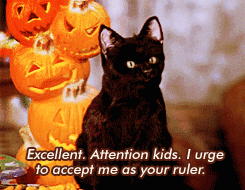Halloween is the time of year where many of us pay homage to our favorite superhero, celebrity crush, or alter egos. However, in doing so, it’s important to consider the choices made when selecting costumes, jewelry, makeup styles, accessories, or even artifacts that can further contribute to harmful, objectifying and stereotypical depictions of various cultures.
Nine years ago, students from Ohio University started the “We’re a Culture, Not a Costume” poster campaign to “make revelers think twice before reducing a culture to a caricature”. This campaign quickly spread across social media and stoked conversations over how to make thoughtful and appropriate decisions about costume choices. Since 2011, the work of these students and subsequent dialogue has inspired similar campaigns, but harmful stereotypes have continued to persist, as evidenced by the myriad of celebrities that have been called out for their costume choices, social media posts and backlash.
The persistence of these costumes and the insistence by those who wear them is a reflection of the ways that harm perpetuates in society, particularly for people who are marginalized due to the social identity groups they belong to.
We know you’re not going to be heading to a Halloween party this year - because social distancing right?! (wink, wink). As you head into your virtual costume contests or prepare your social distancing trick-or-treat table and candy bowl, we want to make sure you are clear on what to do and what not to do. To ensure that your Halloween is fun and scary, not problematic and harmful, check out our guide below.
Let’s start with the basics:
What is Cultural Appropriation? The unacknowledged or inappropriate, typically superficial adoption of the customs, practices, ideas, etc. of a people or society by members of another and typically more dominant people or society. This includes, but is not limited to make up, clothing, hair, and accents.
These things are NEVER ok:
- Black, Red, Yellow or Brown Face: Painting your face or darkening your skin to appear as a different race such as African American, Native American, Asian or Latinx. You may not know this, but this also includes unnecessary and disrespectful changes to our body parts, face, and hair - such as drawing big lips, wearing a “cornrows” wig, hijab, or other religious head coverings, or even stuffing your pants to have a “big butt”. Using or making fun of accents is also harmful and disrespectful.
- Dressing in a fashion that furthers harmful stereotypes or disregards sacred cultural traditions: Dressing as a “Mexican Gardener”, “Black Gangster”, or “Japanese Geisha”. Come on, we know better than this!
- Using makeup to draw sacred or traditional body markings: Many cultures use various forms of body art or body painting as parts of sacred and/or traditional ceremonies. It’s never a good idea to recreate body painting like Mehndi, often used during Hindu weddings, or tribal face painting, common to many ritualistic practices amongst tribes across Africa, as a part of a Halloween costume.
These things ARE ok and creative:
- Dressing as your favorite singer, artist, or historical figure who happens to be of a different race or ethnicity: You can use your clothes, jewelry and attire to embody Mindy, Selena or Beyonce without painting your face. GQ has some recommendations for you…. They even show you how to be “Casual Barack Obama” and “2000 VMAs J Lo”!
- Dressing as a pun or riddle: Put in a little extra thought and dress like a “dad joke” or a “ceiling fan,” or “copycat ”. Here are a few more punny ideas!
- Take on your favorite reality show: Pull out a ball gown and hand out roses, no one will have to guess that you’re the bachelorette!
- When all else fails, be a cat: It’s been a long year! Let’s not exacerbate an already heavy year by being racist, xenophobic, or problematic. The easiest way to avoid cultural appropriation is to grab some cat ears and draw some whiskers! Here is some cat inspo!

Ok, but what about Cultural Appreciation? If your only attempt to “honor a culture” happens during Halloween, it’s not likely “appreciation” of the culture.
What is Cultural Appreciation? Acknowledging and investing in learning of another culture’s customs, practices, ideas, etc; Giving credit/recognition/respect to identifying culture. This means you are investing and learning about cultural customs, histories and practices, long before October 31st. Are you interested in engaging in Cultural Appreciation? Initiatives for Identity, Inclusion & Belonging can help you with that! Join us for any number of programs that help you learn about others, build cross-cultural understanding, and get connected with the UMBC community.
Remember, cultural appropriation is bigger than just Halloween, see below for more easy reads and videos: